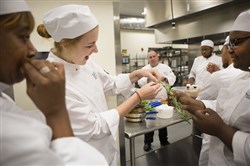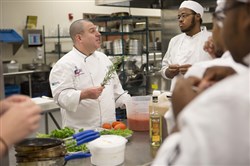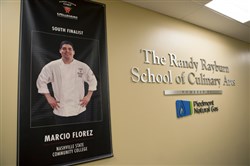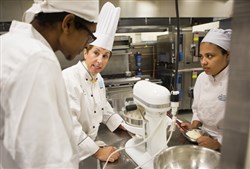VOL. 40 | NO. 38 | Friday, September 16, 2016
Nashville State, other schools struggle to meet demand for restaurant workers
By Jeannie Naujeck

Lucresha Ward, left, Hailey Markum-Zuckowsky and Tyron Thompson, all first-year students at Nashville State Culinary Arts, sample rosemary during a class.
-- Michelle Morrow | The LedgerWant a new career with hot prospects? The hospitality industry is cooking.
Last year Tennessee had a record $18.4 billion economic impact from visitor spending – much of that going to restaurants and hotels.
From fast casual to fine dining, new restaurants are popping up every week – especially in Middle Tennessee, which leads the state’s growth.
But the explosion in restaurants has also led to a labor shortage for both front-of-house and kitchen staff. And that means high demand and good wages for graduates of Tennessee’s culinary arts and hospitality programs.
An affordable culinary degree
Students seeking a culinary degree at Tennessee’s community colleges pay just a fraction of the cost of one of the many private culinary colleges, such as Culinary Institute of America, Johnson & Wales, the Art Institutes, Sullivan University and Kendall College.
But they come out with the same skills.
Both culinary programs at Nashville State Community College and Pellissippi State Community College are certified by the same American Culinary Federation standards as the private schools and are supported by the local hospitality industry through scholarships, teaching by top local chefs and career assistance.
Both community college programs boast 100 percent job placement rates. Ample financial aid is also available to help pay for community colleges through state, federal and hospitality industry sources.
Pellissippi State
Offers a two-year (four semester) program with 60 credit hours
Total cost (in-state tuition) including various nominal campus fees: $2,135 for the fall 2016 semester assuming a full 15-hour course load
Culinary arts program director Tom Gaddis estimates the total cost of attending the two-year program at less than $24,000 and says many students receive financial aid such as federal Pell Grants
Nashville State Community College
Offers a two-year (four semester) program with 61 credit hours and a one-year certificate with 25 credit hours
Tuition for Tennessee residents for the spring 2017 semester is $156 per credit hour up to 12 hours, and $31 per credit hour for additional hours above 12 ($1,965 for 15 hours)
In addition to tuition and school fees, students must purchase their own tools (such as knives) and appropriate chef’s clothing for the food production kitchen. Other expenses might include ingredients needed to prepare recipes for projects or homework assigned outside of class.
“One hundred percent” of students who want jobs get jobs,” says Tom Gaddis, program coordinator for the two-year culinary arts program at Pellissippi State Community College in Knoxville.
The same is true for graduates of the Randy Rayburn School of Culinary Arts at Nashville State Community College.
“It’s a good problem because it shows the industry’s growing. It’s a hard problem because they need the employees to keep their facilities running,” says Paul Brennen, who leads the Nashville State program.
Restaurant seats added over the last five years from post-recession start-ups, the new convention center, and the entry of outside restaurant chains into the market has far outstripped the labor pool, says Rayburn, owner of Midtown Cafe, Cabana and the former Sunset Grill.
Growth will continue as thousands of new hotel rooms are added.
“The No. 1 comment I hear from other owners and managers when we meet is, ‘Got any line cooks you can send me? Dishwashers?’ It’s truly an example of supply and demand,” he says.
Job placement is also 100 percent for graduates of the University of Tennessee-Knoxville bachelors’ degree program in retail, tourism and hospitality management.
“They can pretty much choose where they want to go and what they want to do. Getting jobs has not been a problem,” says Dean Aaser, an instructor, academic advisor and internship coordinator for the program, which he says has doubled in enrollment the past five years.
At a recent career fair, he says, one prominent hotel management company with properties in Nashville scooped up six of his students.

Chef Paul Brennen, director of the School of Culinary Arts at Nashville State, talks with first-year students about herbs.
-- Michelle Morrow | The Ledger“They need the help,” he adds. “Knoxville is doing very well, too, but Nashville just seems to be going off the charts.”
The service industry in the United States has long been seen as a lower-rung career or a summer job. But as the tourism industry becomes more visible, hospitality has gained legitimacy as a viable profession.
Students at UT’s program come out with a solid education in hard skills like cost control and operations management, as well as soft skills like communication and leadership that are prized by employers in all industries.
“Hospitality is the kind of field that people don’t tend to think about as a career,” Aaser explains.
“A lot of times it’s a field that parents don’t think about either. Then when students get to the university they realize that somebody’s making a lot of money off it, and a lot of people are working at Disney and other resorts, and a lot of people are planning meetings and events, and then they realize it’s really a great career option.
“Sometimes it takes a little time for students or parents to grasp how pervasive tourism is but it’s the number one industry in the world. The amount of money that it brings into a state or a community is unbelievable.”
Of the $18.4 billion in tourism impact in 2015, Davidson County brought in $5.7 billion, followed by Shelby County with $3.2 billion and Sevier County with $2 billion, according to the state’s tourist development commissioner. Tourism also generated 157,400 jobs in Tennessee.
State expanding programs
Tennessee’s public higher education system is expanding its hospitality programs to meet the needs of the growing restaurant, hotel and tourism industry in Nashville, Knoxville, Chattanooga and Memphis, which are seeing a boom in leisure and business travel. An influx of new residents is also filling seats.
Last year, Chattanooga State Community College added a new degree program in hospitality and tourism management, with concentrations in hotels, food and beverage, tourism and culinary arts. Hamilton County public schools also added culinary and hospitality programs to their vocational offerings.

A banner recognizing student Marcio Florez hangs in the hallway of The Randy Rayburn School of Culinary Arts at Nashville State Community College.
-- Michelle Morrow | The LedgerPellissippi State currently offers a two-year associate degree in business administration with a concentration in culinary arts, in collaboration with the University of Tennessee, Knoxville.
The two entities are in talks to offer a four-year program, combining advanced culinary skills with advanced management training from UT’s Retail, Hospitality and Tourism Management department. It would be the state’s first culinary bachelor degree, Gaddis says.
The program currently occupies a third of a building and is negotiating to take the whole building to accommodate growth.
And Nashville State relocated its program from White Bridge Road campus to its newer southeast campus near Hickory Hollow and invested in two new training kitchens, doubling the program’s capacity.
It also brought in a top culinary educator to expand into new areas like hospitality management. Brennen came to Nashville a year ago from the much larger School of Hotel and Restaurant Administration at Oklahoma State.
Why would Brennen leave one of the top hospitality programs in the country to come to a humble community college?
Opportunity, and the chance to be in one of the country’s hottest markets.
“With the Nashville hospitality scene growing so rapidly, I thought it would be educational and challenging to come into a community college and try to build it up to a level where it can successfully support the industry,” Brennen points out.
Since Brennen arrived, Nashville State has shown it can punch above its weight.

Chef Marylou Tate, center, assistant professor of Culinary Arts, helps second-year students Paris Johnson, left, and Merlyn Amaya during an advanced baking & pastry class at Nashville State Community College.
-- Michelle Morrow | The LedgerIn March, NSCC student Marcio Florez won the San Pellegrino Almost Famous Chef Competition with a dish of pork tenderloin glazed with Jack Daniel’s and sweet tea.
It was the first time an NSCC student had ever won the regional or national competition, and Florez beat four other finalists from private culinary schools that cost considerably more than NSCC’s $24,000 price tag.
“We definitely opened some eyes all around the country,” Brennen adds.
The community college programs are a terrific deal for state residents interested in the hospitality industry but daunted by the price tags at private culinary schools that cost more than twice as much.
A few prestigious schools like the Culinary Institute of America still carry some weight with employers due to their history and large alumni network.
But for-profit schools like the Art Institute and Le Cordon Bleu have come under fire for high tuition that leaves graduates with massive debt and entry-level salaries. Even students at the CIA have mounted protests over its high cost and what they called declining standards.
“Because the for-profit schools are quite pricy, community college is more of a financially responsible decision for some people,” Brennen says.
“People are starting to realize that it doesn’t matter where you go to school, we’re all teaching the same techniques and fundamentals. We’re all accredited by the ACF.”
In the end, the hospitality industry most rewards talent, drive and experience, all of which Florez has in spades. While attending NSCC, Florez has been working as a line cook at Etch, chef Deb Paquette’s acclaimed restaurant in downtown Nashville where dinner entrees average about $29.
“Marcio would practice and train with us, then he would go work a full night shift for one of the top chefs in the city. So he’s used to the pressure of working at that high a level,” Brennen explains.
“Marcio has stood out since he’s been here. He’s a very unique student.”
Both community college programs work closely with top local chefs and members of the food industry who help shape the curriculum and teach classes, advise on dining trends, and hire students fresh from graduation.
At Nashville State, students get to learn from esteemed local chefs such as Edgar Pendley of Urban Grub, Tandy Wilson of City House, and Max Knoepfel, executive chef at Music City Center. Often they make connections that lead to jobs.
“Those that want to work in the industry, it’s very easy for us to place them in the proper position,” Brennen explains. “We have some great partners in Nashville that want to help support our program any way they can.”
Pellissippi State’s Gaddis works closely with the Knoxville office of food supplier Sysco, which he calls a “fabulous partner.”
As a capstone project during their last semester, students go to Sysco’s kitchen and prepare and present a three-course meal for the Sysco’s president and two dozen area chefs and restaurant owners.
“They have the opportunity to meet these people and talk about their menu and why they chose it,” Gaddis says. “The industry is looking to find out, ‘Do they recognize their mistakes and figure out a way to do it better?’ They make a lasting impression when they’re circling the tables. Very rarely do we have one of those events where every student there doesn’t get a job offer.”
Job opportunities are many and varied. Some students go straight to the kitchens of chain and independent restaurants and work their way up like Christopher Pease, who graduated from Pellissippi State in 2012 and is now chef de cuisine of Lonesome Dove Western Bistro, which opened in June in Knoxville’s Old City. It’s the third outpost of Lonesome Dove, which is owned by celebrity chef and UT-K graduate Tim Love.
Others work in catering, convention centers, hotels, resorts, industrial food services or high-end assisted living facilities. Some go on to further study or open their own businesses, like pastry shops or food trucks. Most stay local.
“For most, their goal is to stay here and grow with Nashville,” Brennen says. “If I were starting out as a cook I can’t think of a better place in the country right now than Nashville, because as it grows they’ll grow with the city.”
Dedication to life
Formal education isn’t the only way to get into restaurant work. Many chefs started bussing tables or washing dishes.
Anthony Bourdain, host of the CNN food and travel show No Reservations and a former chef, has said, “Everything I needed to know I learned as a dishwasher.”
Rayburn is proud of his record of moving up hard workers from entry-level jobs into professional careers.
A recent posting for a full-time dishwasher at Midtown Cafe advertised top wages, meals, medical insurance and benefits, as well as the opportunity to advance through culinary skills training. He says four members of his current culinary team at Midtown Cafe and Cabana started as a dishwasher or steward, an entry-level job that involves cleaning and stocking the kitchen.
“There are unlimited opportunities for hospitality industry growth locally,” he says. “We train job skills for a living.”
As anyone who has worked in the industry knows, it’s more than a job. It’s a lifestyle that can crowd out a lot of other things.
In January 2015, Rayburn closed one of his restaurants, the iconic Sunset Grill, to be more present for his young children. Some of his staff had been there for nearly all of the restaurant’s 24 years.
“If I’d spent more time there day and night, Sunset Grill would still be open, but I chose my wife and the boys to be my first priority,” Rayburn says. “My life changed when I became a father.”
Yet even after more than 40 years in the business, Rayburn has no intention of retiring. He recently added breakfast service at Midtown Cafe, which turns 30 years old next year. And if they show an interest his boys, now 9 and 3, will be introduced to the dishwasher at an appropriate age.
Gaddis says his most successful students display “immediate dedication.”
“I tell them, ‘You’re going to spend more time of your life at work than you’re going to spend at home awake. So whatever you choose to do for a living you should have a passion for it; you should enjoy it.’
“Because if you do, life’s not so bad. You don’t dread going to work; you actually look forward to it. And if you look forward to it, can you really call it work?”